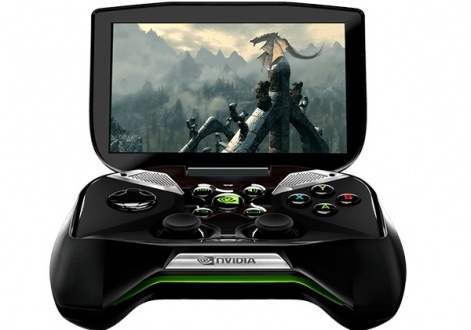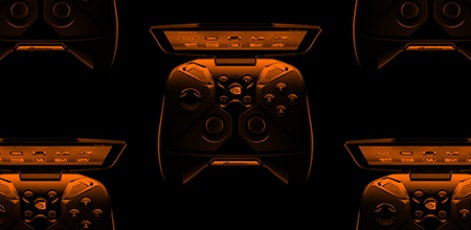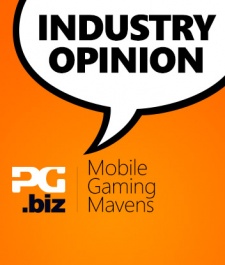2013 has played host to the induction of a new phrase: the "microconsole" - or, if you're PocketGamer.biz editor-at-large Jon Jordan, the much more accurate "unconsole".
Either way, Nvidia's Project Shield is the headline device to emerge from this new trend, though not everyone is convinced it's going to be a success.
Some, for instance, have raised concerns over Nvidia's plan to launch a new version of Shield each and every year.
So, we asked the Mavens:
Will Nvidia's strength be enough to see Project Shield through, or has the company jumped the gun by venturing into an arena that's not yet been properly define?
I think Nvidia is on the right track to defining that market.
After playing mobile games religiously since the Palm phone, I have been invigorated by playing the 3DS XL. I almost forgot how much actual controls can bring to a mobile experience in terms of depth and versatility.
The key pieces will be pricing and an app exclusive. I don't imagine enough people would purchase it for $200. I think the sweet spot is sub $150 right now. Needs to be cheaper than a smartphone that can technically do the same things.

Under Sandy’s leadership, YoYo Games has built an active GameMaker community 250,000-members strong while building partnerships with Amazon, Intel, Microsoft, and Valve that have helped it achieve 200 percent YOY growth in 2012.
Sandy’s previous experience includes a 17-year stint at Microsoft.
The device looks like it was designed by my 7 year old after watching an old episode of Star Trek and studying catalogues of 1980's Citroen dashboard designs. "Beam me up, Gussie."
I hope it's not really intended for consumers and is just a tech demo to show what Tegra 4 can do.
Despite Sony's long history as a consumer electronics company, PS Vita has been a commercial disaster and I really can't see why this lump of ugly glass and plastic from a (highly respected) chip company will outperform it.
[people id="11" name="Brian Baglow"]
It's not about the hardware any more. The PSP and Vita have proved that.
It doesn't matter how shiny, how powerful and how awesome it is at playing games - unless it has a seamless online experience a wide range of games at a wide range of price points, and will allow the users to do exactly what they want with it with regard to music, video, etc.
And will it actually do anything that the potential players other devices don't?
Not seen anything to suggest this so far.
It'll come down to the games. It's aimed at hardcore gamers, so they're going to need a world class catalogue of games to convince people to part with cash. Nvidia doesn't yet have the platform exclusive titles to help create a new audience for the device
Will developers support this? Probably not initially, unless Nvidia is planning to fund original development and offer incentives to port games over to the device. Even the most well funded companies can come totally unhinged when it comes to building a launch catalogue for a new device cough, N-Gage, cough.
Bottom line is that, despite the shiny factor, a lot of devices - from high-end, well-supported devices from 'proper' games companies, through to open source, do-what-you-will emulatorama platforms from good looking rebels who play by their own rules - have failed because they built a gadget rather than an ecosystem with a nice, useable and seamless experience and lots of different games, which are easy to find and buy and play and share and (of course) build.
I hate being a sceptic, but this has big fat fail written all over it at the moment.[/people]
It's my feeling that the future of the "microconsole" is where it has always been: Software, running on your primary mobile communications device.
You go to a friend's house, place your phone down on the coffee table, and the phone broadcasts video to the television, audio to the stereo, and you have game controllers (or, hey, even mouse and keyboard) that communicate input wirelessly to the phone.
Maybe you don't need a television and a stereo because the phone has a pico projector and surround-sound headphones.
The battle for the living room was nothing compared to the war for the pocket: In the future, all terminals are dumb terminals, and all of the smarts will be in the phones smartphones!
Sandy's comment was spot on. The design is much to be desired but I wouldn't quite call it a console. It's more like a gimmicky gamepad.
I'm sure that no one will get this to play Android games - the main appeal is to play PC games while sitting on the couch. To be honest, I'm a bit interested in that concept.
I find, more and more, that I really don't have the time to sit locked in front of the TV using my Xbox or PS3 anymore. I have to share the TV with my wife who would rather watch real life murder mystery's rather than watch me hack away at Borderlands 2.
Portable experiences are just a lot more versatile. I can play a little in bed before I go to sleep, I can play it on the couch. Even the loo is turning out to be the arcade of the 21st century. The appeal of Shield is that you can take the PC game experience to any room in the house.
Now, I'm not quite sure if the shield form factor will be the one that actually wins, but it really doesn't matter. Shield is a device that doesn't need an ecosystem. It rides on top of the existing PC ecosystem.
For instance, one person can buy the shield, and someone else can buy that new razor Windows 8 gaming tablet. They will both be supporting the same ecosystem.
Shield doesn't need to get Sony or Microsoft numbers - Nvidia just needs to turn a profit on each device. It can be a hobby similar to how Apple TV is a hobby for Apple. Maybe Nvidia will learn something along the way to help a future generation of Shield take off.
Because of the mobile streaming factor, I think this is a lot more exciting than Ouya or Valve's Steam Box. Ouya needs to create an entire ecosystem, so it needs to pull in much bigger numbers than it got on Kickstarter to be successful. Plus, it also pins users to stationary TV, which I think is the wrong direction for the future of gaming.
Steam Box already has the ecosystem, but Valve is trying to take users who are chained to their computers and instead chain them to the TV. The TV should be an option for gaming consoles in the future, but you need to be able to take it with you.
I think the ultimate console is primarily a mobile device with the option of streaming output to your TV or PC. There are a lot of potential solutions to make this happen but so far no one has quite worked it out yet.
Wii U, Apple AirPlay, PS Vita remote play, OnLive, Xbox SmartGlass - I'm assuming they will be looking at streaming full games in the future. All these platforms are trying to free the high end console experience from the TV, but technology just isn't there yet to do it. Although the Wii U is probably the closest in terms of low lag and form factor.

Alongside multiple industry roles, Volker is the co-founder Oystercrowd, Blue Beck, and Digital M. Former posts at BlackBerry and Scoreloop add to an enviable CV, which also includes the co-founding of Connect2Me
Three words: Single purpose device. I can't see it winning.
The experience Dave described can also be achieved by adding controllers to tablets, phones, whatever. And for the vast majority of people, their regular touch interface will just do.
If you do want to connect controllers: the BlackBerry 10 native API has support for Wiimote, Gametel and Steel Series built in, and more to come.

John is co-founder of PR and marketing company Big Ideas Machine. Also an all-round nice guy...
I'm pretty sure that Project Shield was just a way for Nvidia to grab lots of attention at (a pretty un-newsworthy) CES. After all, announcing a surprising new consumer device is a lot more exciting than just showing off the new version of your chipset.
Why would Nvidia want to go direct to consumers with a new device? Does it really want the cost and the headache of retail, distribution and customer after-care in the current economic climate?
And, above all, why would Nvidia want to start competing with its customers - especially at a time where it's getting real traction from tablet and smartphone manufacturers who are choosing Nvidia over rival Qualcomm?
I think it's done a brilliant job of getting people talking about Nvidia. If we never hear or see it again, then it's still a job very well done.

Oscar Clark has been a pioneer in online, mobile, and console social games services since 1998. He is also author of the book, Games As A Service – How Free To Play Design Can Make Better Games.
I can't disagree with John - if its about creating a headline then its already succeeded.
I also suspect it could do more - not necessarily making Project Shield huge as a console replacement, but the interesting thing for me is the idea of this approach to create a trojan horse.
A reason for developers to create cutting more edge gaming that uses the full power of the Tegra chipset and that will help content on all Android devices; provided they are sensible about exclusivity periods.
Sandy is right that the form factor design is pretty poor and I doubt that, even if Nvidia fixes that in the final version, it will sell huge numbers, but I could see some hardcore gamers buying this as a niche device to get the 'best experience' and to play their Steam games on a handheld. That might be enough to kick off a drive for new content.
For me, the device doesn't have to sell well for it to be a worthwhile experiment for the green team.
Is this where I admit that I used to work for Nvidia? So, I am a little biased toward my former colleagues.

As to the wider issue - there is clearly a movement to create alternatives to the classical console box and most will fail. But I'm happy to have made my small Kickstarter investments in Ouya and Gamestick - we will see what evolves and what dies.

Adam has been in the mobile game industry since 2007, creating games independently. He's since grown into a full 50+ person studio manager.
Recently he's taken a position at Wooga in Berlin to sharpen his design skills and work with the world's best to create amazing, well-crafted products onto the mobile marketplace.
Shield tries to be too many things at once. Jack of all trades, master of none.
It's really hard to launch a game console if you don't understand games, and I don't think Nvidia understands, or wants to understand, games.
I don't think they would.
As a developer and a player, Ouya captured my attention and imagination. This, however, just feels like a...thing. Not even a "I don't get it but it's cool" thing, just a thing.
Meh. Next!
I think we all have to give Nvidia a good deal of credit for trying to crack the nut that so many other companies - both hardware and game developers - are struggling with.
Bridging the gap between mobile and console experiences is no easy task, yet this multi-billion dollar company is jumping in head first into unproven, relatively untested waters.
Do I think this first iteration of Project Shield is the answer? Probably not, but blasting a huge company for taking a big risk - when we've been clamouring for exactly that for the better of the last several years - seems slightly hypocritical.

I'm with Sean. I'm still not really sure what it is. Feels like something the engineers cooked up without checking in with product managers or marketing.
I have been thinking about this recently. The truth is, that many design considerations for console and mobile are entirely different.
Mobile is built around touchscreen controls, casual gamers, five minute gaming sessions, and suits step by step (pick up put down) actions due to unpredictable and changeable play environment
Console is all about pad controls, more hardcore gamers, 30 minutes minimum playing sessions, suits continuous action due to immersive stable environment i.e. at home on sofa.
Very few games have bridged this gap for good and very physical reasons.
Also, mouse controls map to touch screen much better than joypad, so PC/Mac/mobile seems a more natural relationship to me in terms of "play at work while the boss isn't watching" game design.
There is a second mobile category though. It's a little more niche but it's there.
People want the ability to play console quality games around the house. Before bed, on the couch while someone else is watching TV. This is where the 3DS and Vita market is going.
The problem with the vita is that it's a great machine, but publishers are not supporting it. It might be a little expensive for consumers considering it's mobile only. If there was more acceptance of remote play among developers, I think the Vita would do better.
The DS did really well and the 3DS is doing well. As long as publishers are still treating tablets and iPhones as five minute experiences, there will still be a market for these gaming only mobile devices. I think that's what shield is trying to connect with. If only it looked a little more like the Wii U game pad, I think it would have more of a shot.

Alongside multiple industry roles, Volker is the co-founder Oystercrowd, Blue Beck, and Digital M. Former posts at BlackBerry and Scoreloop add to an enviable CV, which also includes the co-founding of Connect2Me
How are the 3DS and Vita markets growing exactly, Dave?
The fact that most people on the Mavens are excited about hardcore gaming gadgets won't save either, I'm afraid to say. The little I have seen in terms of numbers does not suggest that Nintendo or Sony landed monstrous hits here.
3DS is consistently the best-selling gaming platform month after month.
Of course it's market is small compared to phones and tablets, but when it comes to console-like experiences, mobile gaming consoles have sold much better than TV based consoles since the DS. The best-selling console of all time is the DS.

Alongside multiple industry roles, Volker is the co-founder Oystercrowd, Blue Beck, and Digital M. Former posts at BlackBerry and Scoreloop add to an enviable CV, which also includes the co-founding of Connect2Me
Dave, the question is not if touchscreen-based freemium sandwiches will replace big-screen immersive PC or console candle light dinners.
The question is, if memory serves, whether we think that one small-screen device (Shield) had a chance against other small-screen devices (mobile, etc), and I argued it hadn't.
I am pretty sure that, in the mid-term (or perhaps even short term), the space for handheld "consoles" will be squeezed by stronger mobile devices, tablets and phones.
If the question is, "Will Shield succeed?", then the answer is a giggling, "No."
Nvidia's organisational value framework is not aligned for consumer-facing 'microconsole.' And why are we saying microconsole instead of handheld? Is there any true market separation from Shield, Vita, DS or N-Gage?































